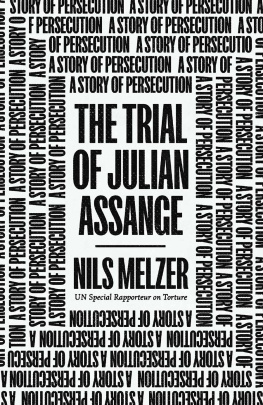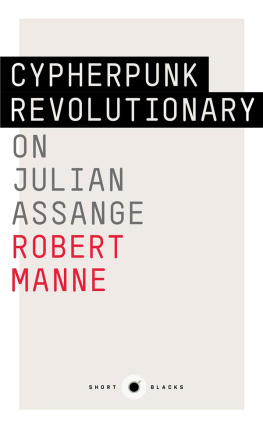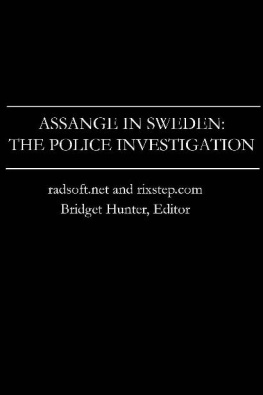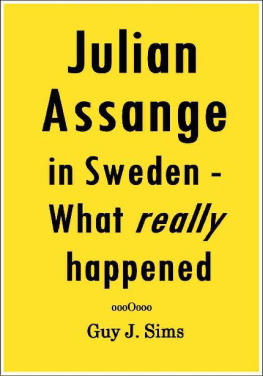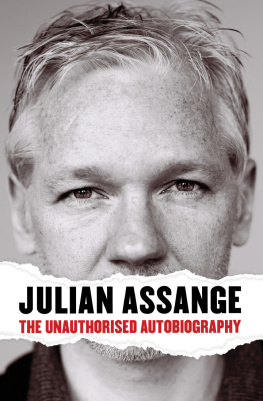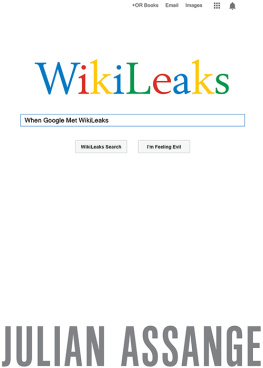Contents
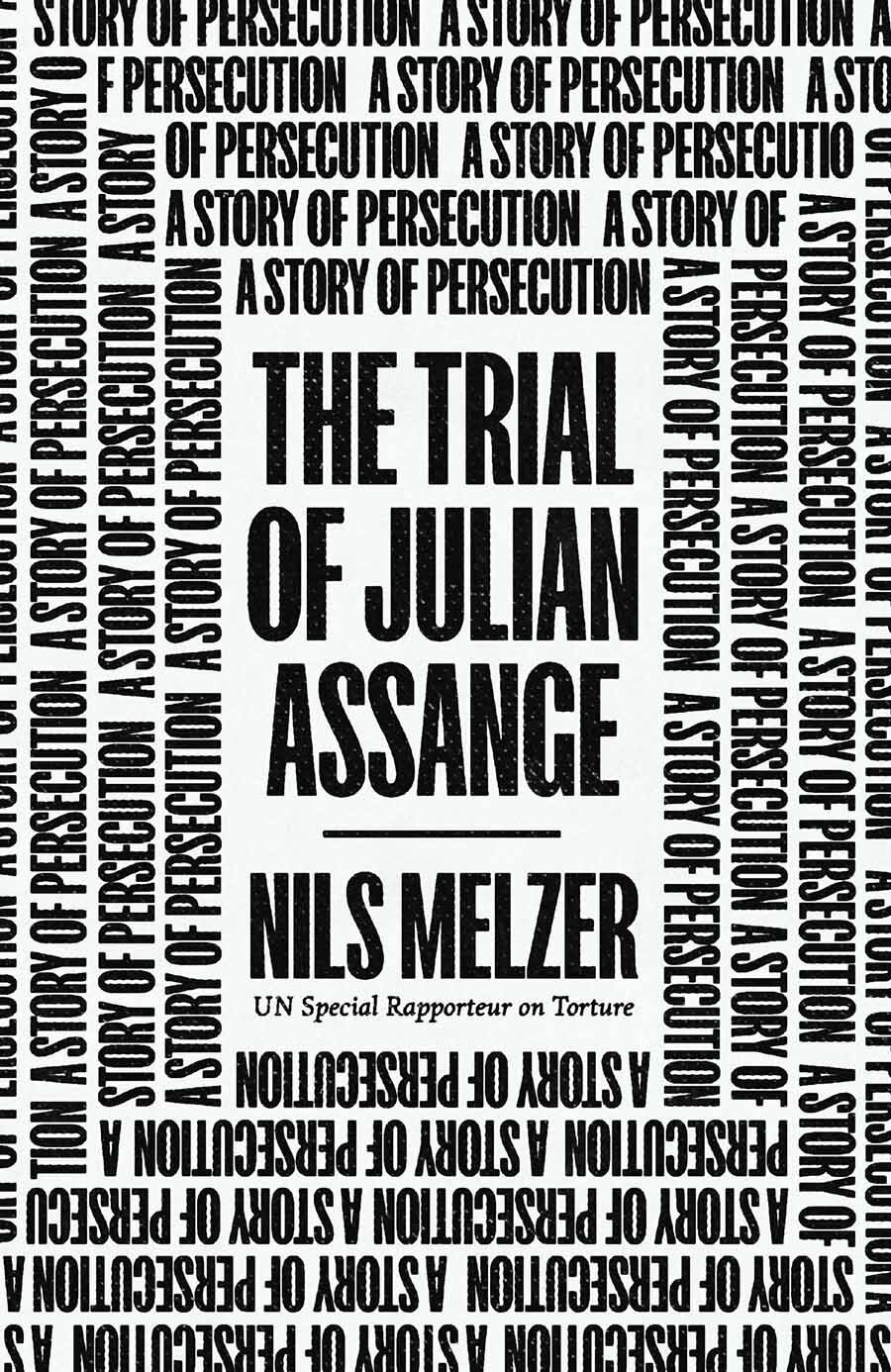
The Trial of Julian Assange
The Trial of
Julian Assange
A Story of Persecution
Nils Melzer
(with Oliver Kobold)

First published by Verso Books 2022
Nils Melzer 2022
All rights reserved
The moral rights of the author have been asserted
1 3 5 7 9 10 8 6 4 2
Verso
UK: 6 Meard Street, London W1F 0EG
US: 20 Jay Street, Suite 1010, Brooklyn, NY 11201
versobooks.com
Verso is the imprint of New Left Books
ISBN-13: 978-1-83976-622-0
ISBN-13: 978-1-83976-625-1 (US EBK)
ISBN-13: 978-1-83976-624-4 (UK EBK)
British Library Cataloguing in Publication Data
A catalogue record for this book is available from the British Library
Library of Congress Cataloging-in-Publication Data
Names: Melzer, Nils, author.
Title: The trial of Julian Assange : a story of persecution / Nils Melzer, (with Oliver Kobold).
Description: First Edition Hardback. | Brooklyn, NY ; London : Verso Books, 2022. | Includes bibliographical references and index.
Identifiers: LCCN 2021049427 (print) | LCCN 2021049428 (ebook) | ISBN 9781839766220 (Hardback) | ISBN 9781839766251 (eBook)
Subjects: LCSH: Political persecution. | Assange, Julian Trials, litigation, etc. | Political corruption. | Asylum, Right of. | Due process of law. | Press and politics.
Classification: LCC JC571 .M3985 2022 (print) | LCC JC571 (ebook) | DDC 323/.044 dc23/eng/20211109
LC record available at https://lccn.loc.gov/2021049427
LC ebook record available at https://lccn.loc.gov/2021049428
Typeset in Sabon by MJ & N Gavan, Truro, Cornwall
Printed and bound by CPI Group (UK) Ltd, Croydon CRO 4YY
To all who fearlessly fight for the truth .
Those who sleep in a democracy will wake up in a dictatorship .
Otto Gritschneder
Contents
For a special rapporteur of the United Nations, writing a book is not really part of the job description. Especially not a book on an individual case. An explanation is therefore in order. This book is intended to be an urgent appeal. An admonition to the international community of states that the system they have established for the protection of human rights is failing in a very fundamental way. A wake-up call to the general public, because a systemic failure of such magnitude ought to raise alarm bells with any ordinary citizen of a democratic state. A call, therefore, that should also be understood as a personal challenge to each and every one of us: to open our eyes, to face the truth, and to take personal and political responsibility.
As the special rapporteur on torture, I am mandated by the United Nations Human Rights Council to monitor compliance with the prohibition of torture and ill-treatment worldwide, to examine allegations of violations, and to transmit queries and recommendations to the states concerned with a view to clarifying individual cases. I was entrusted with this important mandate because I have been dealing with violations of human rights and humanitarian law for more than twenty years, whether as a senior security policy advisor to my government, as a professor of international law and an expert author, or as a Red Cross delegate and legal advisor in contexts of war and crisis. I have visited thousands of prisoners, refugees and their loved ones on four continents, many of them victims of torture and violence. I have negotiated not only in palaces, ministries and command centres, but also with soldiers and rebels in the no-mans-land between front lines.
Hence, when I investigate allegations of torture and ill-treatment, I know what I am talking about. I am not easily manipulated and dont tend to exaggerate, nor do I seek the limelight. My world is one of diplomatic dialogue and mutual respect but always also of truth and integrity, because diplomacy must never be allowed to become an end in itself but must always remain a means to a higher end. In my case, this higher end is to achieve compliance with the universal prohibition of torture and ill-treatment, as well as the investigation, punishment and redress of violations. This purpose I must always pursue and may never sacrifice. If it can no longer be achieved through diplomatic channels, then I must choose other means. One of these means, dear reader, is the present book. Thus, to rephrase a martial maxim for my peaceful purposes, this book could be described as the continuation of diplomacy by other means.
I write this book because, when investigating the case of Julian Assange, I came across compelling evidence of political persecution and gross judicial arbitrariness, as well as of deliberate torture and ill-treatment. But the responsible states refused to cooperate with me in clearing up these allegations, and to initiate the investigative measures required by international law. I visited Julian Assange in prison with a team of medical doctors and spoke to the authorities in charge, as well as to lawyers, witnesses and experts. I have repeatedly expressed my concerns to all four states involved the United Kingdom, Sweden, Ecuador and the United States through the official channels available to me. I have requested clarifications and recommended specific measures. None of the four governments were willing to engage in a constructive dialogue. Instead, I was confronted with diplomatic platitudes or sweeping rhetorical attacks. When I insisted, the dialogue was terminated by the governments. At the same time, the persecution and mistreatment of Julian Assange intensified, violations of his due process rights became increasingly blatant and my public appeals calling on the authorities to respect human rights were ignored. Even from within the UN system, I received hardly any support, with the notable exception of a few courageous and determined individuals. I expressed my concern about the obstructive stance of the involved states both at the Human Rights Council in Geneva and at the General Assembly in New York without any substantial reaction. I repeatedly asked the High Commissioner for Human Rights for a personal meeting about the matter, but was fobbed off. I called on other states to exert their influence, but virtually always faced an awkward wall of silence. The institutions and processes I had always believed in were failing before my eyes.
You may wonder why I should speak out so forcefully in this particular case. After all, Julian Assange is hardly the only victim of torture who has not received justice, nor is his abuse the most severe form of torture I have encountered in my work. All of this is correct. The reason for my strong engagement in this case is that its importance extends far beyond Julian Assange as an individual and, indeed, far beyond the states directly involved. It reveals a generalized systemic failure gravely undermining the integrity of our democratic institutions, our fundamental rights, and the rule of law more generally. It is a systemic failure that I routinely encounter in my daily work, but that usually plays out behind the scenes, and therefore remains largely concealed from the broader public.
The Assange case is the story of a man who is being persecuted and abused for exposing the dirty secrets of the powerful, including war crimes, torture and corruption. It is a story of deliberate judicial arbitrariness in Western democracies that are otherwise keen to present themselves as exemplary in the area of human rights. It is a story of wilful collusion by intelligence services behind the backs of national parliaments and the general public. It is a story of manipulated and manipulative reporting in the mainstream media for the purpose of deliberately isolating, demonizing, and destroying a particular individual. It is the story of a man who has been scapegoated by all of us for our own societal failure to address government corruption and state-sanctioned crimes. It is thus also a story about each and every one of us, our lethargy, our self-deception and our co-responsibility for the political, economic and human tragedies of our time.


